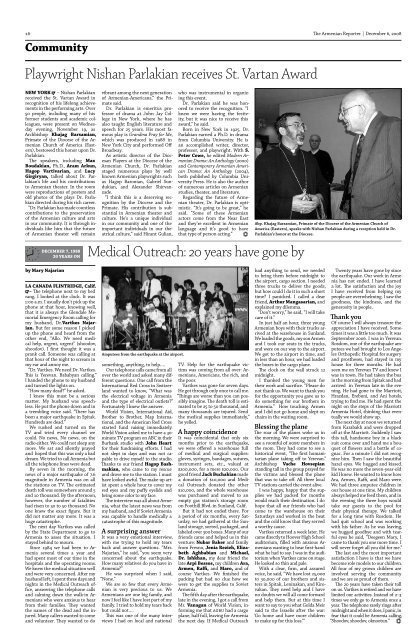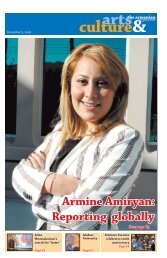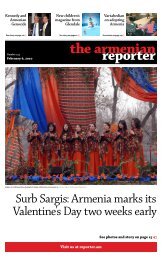National, International, Armenia, and Community News and Opinion
National, International, Armenia, and Community News and Opinion
National, International, Armenia, and Community News and Opinion
Create successful ePaper yourself
Turn your PDF publications into a flip-book with our unique Google optimized e-Paper software.
16 The <strong>Armenia</strong>n Reporter | December 6, 2008<strong>Community</strong>Playwright Nishan Parlakian receives St. Vartan AwardNEW YORK – Nishan Parlakianreceived the St. Vartan Award inrecognition of his lifelong achievementsin the performing arts. Over50 people, including many of hisformer students <strong>and</strong> academic colleagues,were present on Wednesdayevening, November 19, asArchbishop Khajag Barsamian,Primate of the Diocese of the <strong>Armenia</strong>nChurch of America (Eastern),bestowed this honor upon Dr.Parlakian.The speakers, including MaxBoudakian, Ph.D., Aram Arkun,Hagop Vartivarian, <strong>and</strong> LucyGirgiryan, talked about Dr. Parlakian’slife <strong>and</strong> his contributionsto <strong>Armenia</strong>n theater. In the roomwere reproductions of posters <strong>and</strong>old photos of the plays Dr. Parlaki<strong>and</strong>irected during his rich career.“Dr. Parlakian has made countlesscontributions to the preservationof the <strong>Armenia</strong>n culture <strong>and</strong> artsin our community. It is through individualslike him that the futureof <strong>Armenia</strong>n theater will remainDECEMBER 7, 198820 YEARS ONvibrant among the next generationof <strong>Armenia</strong>n-Americans,” the Primatesaid.Dr. Parlakian is emeritus professorof drama at John Jay Collegein New York, where he hasalso taught English literature <strong>and</strong>speech for 25 years. His most famousplay is Gr<strong>and</strong>ma Pray for Me,which was produced in 1988 inNew York City <strong>and</strong> performed OffBroadway.As artistic director of the DiocesanPlayers at the Diocese of the<strong>Armenia</strong>n Church, Dr. Parlakianstaged numerous plays by wellknown <strong>Armenia</strong>n playwrights suchas Hagop Baronian, Gabriel Sundukian,<strong>and</strong> Alex<strong>and</strong>er Shirvanzade.“I think this is a deserving recognitionby the Diocese <strong>and</strong> thePrimate. His contribution is substantialin <strong>Armenia</strong>n theater <strong>and</strong>culture. He’s a unique individualin our community <strong>and</strong> one of theimportant individuals in our theatricalculture,” said Hirant Gulian,who was instrumental in organizingthis event.Dr. Parlakian said he was honoredto receive the recognition. “Iknew we were having the festivity,but it was nice to receive thisaward,” he said.Born in New York in 1925, Dr.Parlakian earned a Ph.D. in dramafrom Columbia University. He isan accomplished writer, director,professor, <strong>and</strong> playwright. With S.Peter Cowe, he edited Modern <strong>Armenia</strong>nDrama: An Anthology (2000)<strong>and</strong> Contemporary <strong>Armenia</strong>n AmericanDrama: An Anthology (2004),both published by Columbia UniversityPress. He is also the authorof numerous articles on <strong>Armenia</strong>nstudies, theater, <strong>and</strong> literature.Regarding the future of <strong>Armenia</strong>ntheater, Dr. Parlakian is optimistic.“It’s going to be great,” hesaid. “Some of these <strong>Armenia</strong>nactors come from the Near East<strong>and</strong> they’re excellent in <strong>Armenia</strong>nlanguage <strong>and</strong> it’s good to havethat type of person acting.” Medical Outreach: 20 years have gone byAbp. Khajag Barsamian, Primate of the Diocese of the <strong>Armenia</strong>n Church ofAmerica (Eastern), speaks with Nishan Parlakian during a reception held in Dr.Parlakian’s honor at the Diocese.by Mary NajarianLA CANADA FLINTRIDGE, Calif.– The telephone next to my bedrang. I looked at the clock. It was1:00 a.m. I usually don’t pick up thephone at that hour, knowing well,that it is always the Glendale MemorialEmergency Room calling formy husb<strong>and</strong>, Dr.Vartkes Najarian.But for some reason I pickedup the phone <strong>and</strong> heard from theother end, “Allo. We need medicalhelp, urgent, urgent” (shoodov,shoodov). I first thought it was aprank call. Someone was calling atthat hour of the night to scream inmy ear <strong>and</strong> annoy me.“Dr. Vartkes. We need Dr. Vartkes.This is Yerevan. Bababyan calling.”I h<strong>and</strong>ed the phone to my husb<strong>and</strong><strong>and</strong> turned the lights on.“How many dead?” he asked.I knew this must be a seriousmatter. My husb<strong>and</strong> was speechless.He put the phone down <strong>and</strong> ina trembling voice said. “There hasbeen a major earthquake in Spitak.Hundreds are dead.”We rushed <strong>and</strong> turned on theTV <strong>and</strong> tried every channel wecould. No news, No news, on theradio either. We could not sleep anymore. We sat <strong>and</strong> silently prayed<strong>and</strong> hoped that this was only a baddream. We tried to call <strong>Armenia</strong> butall the telephone lines were dead.By seven in the morning, thenews of a major earthquake of 7.6magnitude in <strong>Armenia</strong> was on allthe stations on TV. The estimateddeath toll was somewhere around 5<strong>and</strong> 10 thous<strong>and</strong>. By the afternoon,however, the number of fatalitieshad risen to 30 to 50 thous<strong>and</strong>. Noone knew the exact figure. But itdid not matter any more. It was ahuge catastrophe.The next day Vartkes was calledby the State Department to go to<strong>Armenia</strong> to asses the situation. Istayed behind to mourn.Since 1984 we had been to <strong>Armenia</strong>several times a year <strong>and</strong>had spent most of our time in thehospitals <strong>and</strong> the operating rooms.We knew the medical situation well<strong>and</strong> were very concerned. After myhusb<strong>and</strong> left, I spent three days <strong>and</strong>nights in the Medical Outreach office,answering the telephone calls<strong>and</strong> calming down the walk-in <strong>Armenia</strong>nswho were anxious to hearfrom their families. They wantedthe names of the dead <strong>and</strong> the injured.Many callers wanted to come<strong>and</strong> volunteer. They wanted to doAmputees from the earthquake at the airport.something, anything, to help….Our telephone calls came from allover the world <strong>and</strong> asked many differentquestions. One call from the<strong>International</strong> Red Cross in Switzerl<strong>and</strong>wanted to know, “What wasthe electrical voltage in <strong>Armenia</strong><strong>and</strong> the type of electrical outlets?”Fortunately I knew the answer.World Vision, <strong>International</strong> Aid,Brother to Brother, Map <strong>International</strong>,<strong>and</strong> the American Red Crossstarted fund raising immediately.World Vision asked me to have a 30-minute TV program on ABC in theirBurbank studio with John Heartfor their fundraising efforts. I hadnot slept in days <strong>and</strong> was not capableto drive myself to the studio.Thanks to our friend Hagop Bashmakian,who came to my rescue<strong>and</strong> drove me to the station. I musthave looked awful. The make-up artistspent a whole hour to cover myred eyes <strong>and</strong> my puffy eyelids <strong>and</strong>bring some color to my face.The interview was all about <strong>Armenia</strong>,what the latest news was frommy husb<strong>and</strong>, <strong>and</strong> if Soviet <strong>Armenia</strong>was capable to h<strong>and</strong>le medically acatastrophe of this magnitude.A surprising answerIt was a very emotional interview,with me trying to hold my tearsback <strong>and</strong> answer questions. “Mrs.Najarian,” he said, “you seem veryconcerned about the earthquake.How many relatives do you have in<strong>Armenia</strong>?”He was surprised when I said,“None.”We are so few that every <strong>Armenia</strong>nis very precious to us. We<strong>Armenia</strong>ns are one big family, <strong>and</strong>now I feel like I have lost part of myfamily. I tried to hold my tears backbut could not….This was one of the many interviewsI had on local <strong>and</strong> nationalTV. Help for the earthquake victimswas coming from all over: <strong>Armenia</strong>ns,Americans, the rich, <strong>and</strong>the poor.Vartkes was gone for seven days.He got through only once to call me.“Things are worse than you can possiblyimagine. The death toll is estimatedto be 25 to 50 thous<strong>and</strong>, <strong>and</strong>many thous<strong>and</strong>s are injured. Sendthe medical supplies immediately,”he yelled.A happy coincidenceIt was coincidental that only sixmonths prior to the earthquake,we were offered a warehouse fullof medical <strong>and</strong> surgical supplies:gloves, syringes, b<strong>and</strong>ages, sutures,instrument sets, etc., valued at$200,000, for a mere $20,000. Ourgood friend Jack Buchakian madea donation of $10,000 <strong>and</strong> MedicalOutreach donated the other$10,000, <strong>and</strong> the whole warehousewas purchased <strong>and</strong> moved to anempty gas station’s storage roomon Foothill Blvd. in Sunl<strong>and</strong>, Calif.But it had not ended there. Fora period of six months, every Saturday,we had gathered at the Sunl<strong>and</strong>storage, sorted, packaged, <strong>and</strong>labeled over 300 boxes. Many of ourfriends came <strong>and</strong> helped us in thisventure: Nubar Baker <strong>and</strong> familyfrom Fresno, Jenia Rezieh, ElizabethAghbabian <strong>and</strong> Michael,Dr. Ishkhan, my dear friend thelate Arpi Bessos, my children Ara,Armen, Raffi, <strong>and</strong> Maro, <strong>and</strong> ofcourse Vartkes. We finished thepacking but had no clue how wewere to get the supplies to Soviet<strong>Armenia</strong>.The fifth day after the earthquake,late in the evening, I got a call fromMr. Vanagan of World Vision, informingme that agbu had a cargoplane, half full, leaving for <strong>Armenia</strong>the next day. If Medical Outreachhad anything to send, we neededto bring them before midnight tothe airport, cargo section. I neededthree trucks to deliver the goods,but how could I do it in such a shorttime? I panicked. I called a dearfriend, Arthur Mangasarian, <strong>and</strong>explained my dilemma.“Don’t worry,” he said, “I will takecare of it.”In just half an hour, three young<strong>Armenia</strong>n boys with their trucks arrivedat the warehouse in Sunl<strong>and</strong>.We loaded the goods, my son Armen<strong>and</strong> I took our seats in the trucks,<strong>and</strong> were on our way to the airport.We got to the airport in time, <strong>and</strong>in less than an hour, we had loadedthe boxes in the cargo plane.The clock on the wall struck 12midnight.I thanked the young men fortheir work <strong>and</strong> sacrifice. “Please donot thank us. We want to thank youfor the opportunity you gave us todo something for our brothers in<strong>Armenia</strong>.” How touching. Armen<strong>and</strong> I did not go home <strong>and</strong> slept onchairs in the waiting room.Blessing the planeThe roar of the planes woke us inthe morning. We were surprised tosee a roomful of agbu members inthe room. They had come to see ahistorical event, “The first humanitarianplane taking off to Yerevan.”Archbishop Vache Hovsepianst<strong>and</strong>ing tall in the group prayed forthe victims <strong>and</strong> blessed the planethat was to take off. All three localTV stations carried the event alive.I was happy, happy that the supplieswe had packed for monthswould reach their destination. I dohope that all our friends who hadcome to the warehouse on theirSaturdays <strong>and</strong> worked in the heat<strong>and</strong> the cold know that they serveda worthy cause.Vartkes returned a week later. Hecame directly to Hoover High Schoolauditorium, filled with anxious <strong>Armenia</strong>nswanting to hear first-h<strong>and</strong>what he had to say. I was in the auditoriumwhen Vartkes came on stage.He looked so thin <strong>and</strong> pale.With a clear, firm, <strong>and</strong> assuredvoice, he said, “We have lost 25,000to 30,000 of our brothers <strong>and</strong> sistersin Spitak, Leninakan, <strong>and</strong> Kirovakan.They need help <strong>and</strong> I haveno doubts we will all come forward<strong>and</strong> help them. But at this time Iwant to say to you what Golda Meirsaid to the Israelis after the war:‘Go home <strong>and</strong> have more childrento make up for this loss.’”Twenty years have gone by sincethe earthquake. Our work in <strong>Armenia</strong>has not ended. I have learneda lot. The satisfaction <strong>and</strong> the joyI have received from helping mypeople are overwhelming. I saw thegoodness, the kindness, <strong>and</strong> thegenerosity in people.Thank youOf course I will always treasure theappreciation I have received. Sometimesit was a little too much. It wasSeptermber 2006. I was in Yerevan.Rosdom, one of the earthquake amputeeswe had brought to Los AngelesOrthopedic Hospital for surgery<strong>and</strong> prostheses, had stayed in myhouse for three months. He hadseen me on Yerevan TV <strong>and</strong> knew Iwas in town. He had taken the busin the morning from Spitak <strong>and</strong> hadarrived in Yerevan late in the evening.He had gone to the Marriott,Hrazdan, Erebuni, <strong>and</strong> Ani hotels,trying to find me. He had spent thenight on the steps of the Marriott<strong>Armenia</strong> Hotel, thinking that eventuallywe would show up.The next day at noon we returnedfrom Karabakh <strong>and</strong> were droppedoff at the Marriott. Suddenly I sawthis tall, h<strong>and</strong>some boy in a blacksuit come over <strong>and</strong> h<strong>and</strong> me a bouquetof flowers <strong>and</strong> a bottle of cognac.For a minute I did not recognizehim. Then I saw the beautifulhazel eyes. We hugged <strong>and</strong> kissed.He was no more the seven-year-oldkid I knew. He wanted to know howAra, Armen, Raffi, <strong>and</strong> Maro were.We had three amputee children inour house at one time. My childrenalways helped me feed them, <strong>and</strong> inthe evening the three boys wouldtake our guests to the pool fortheir physical therapy. We talkedfor a long time with Rosdom. Hehad quit school <strong>and</strong> was workingwith his father. As he was leaving,we hugged goodbye <strong>and</strong> with tearfuleyes he said, “Deegeen Mary, Icame to thank you one more time. Iwill never forget all you did for me.”The last <strong>and</strong> the most importantsatisfaction I have is that we havebecome role models to our children.All four of my grown children areinvolved serving the community<strong>and</strong> we are so proud of them.The 20 years have taken their tollon us. Vartkes is retired <strong>and</strong> we havelimited our activities. Instead of 2–3times we only go to <strong>Armenia</strong> once ayear. The telephone rarely rings aftermidnight <strong>and</strong> when it does, I panic, infear that it could be <strong>Armenia</strong> calling,“Shoodov, shoodov, oknootun.”

















